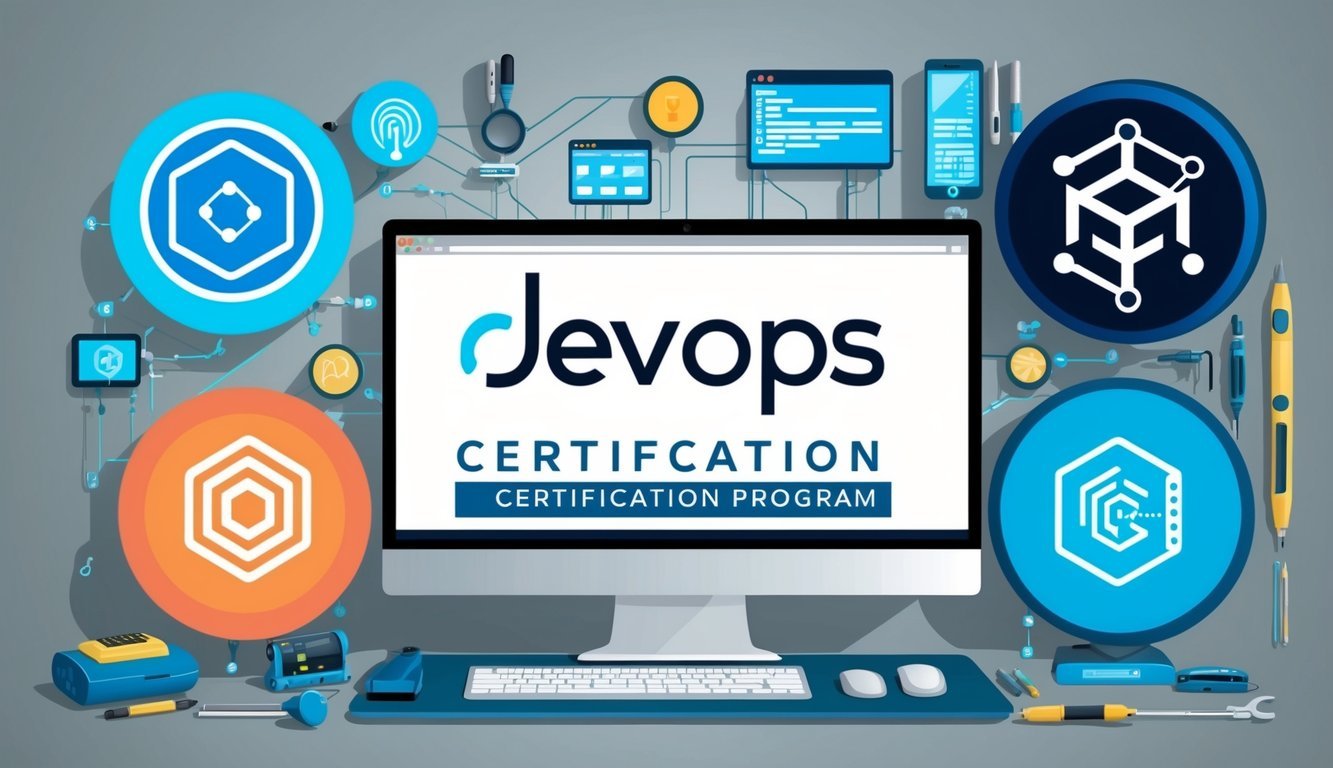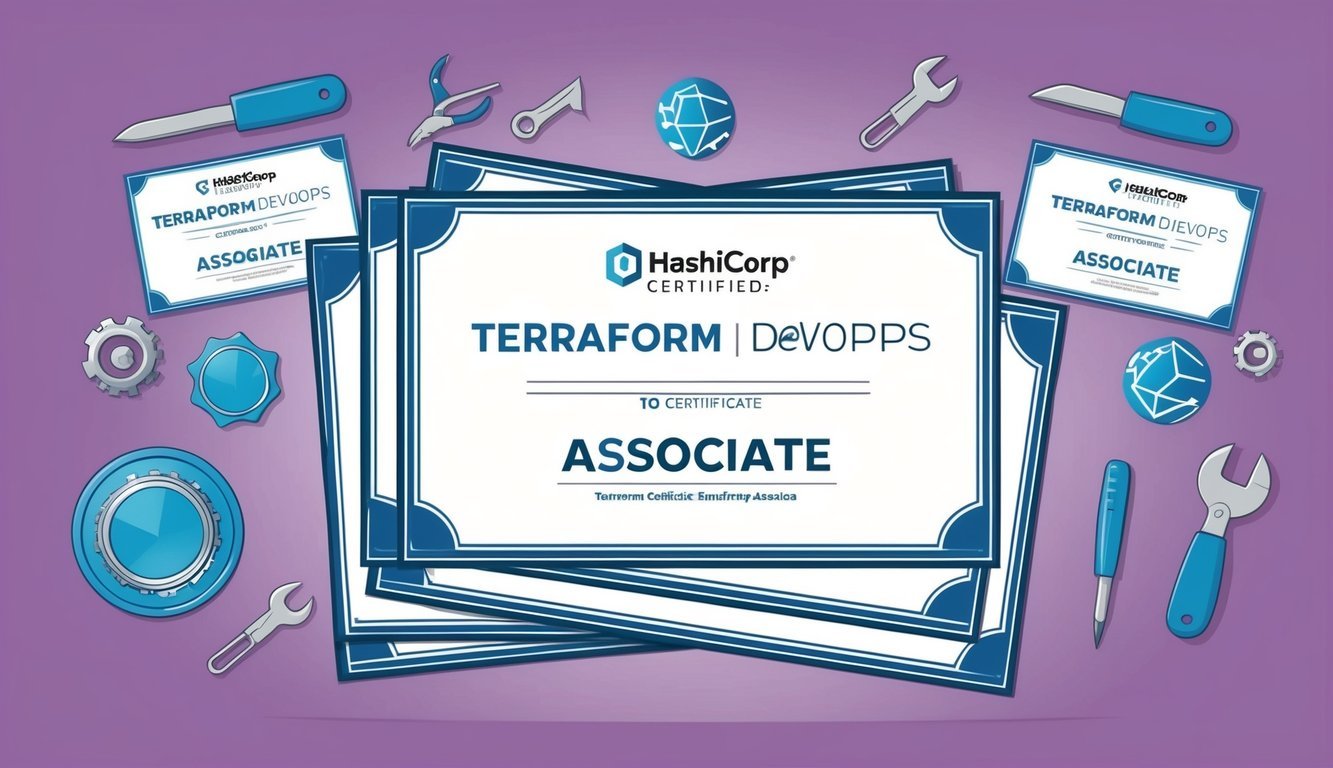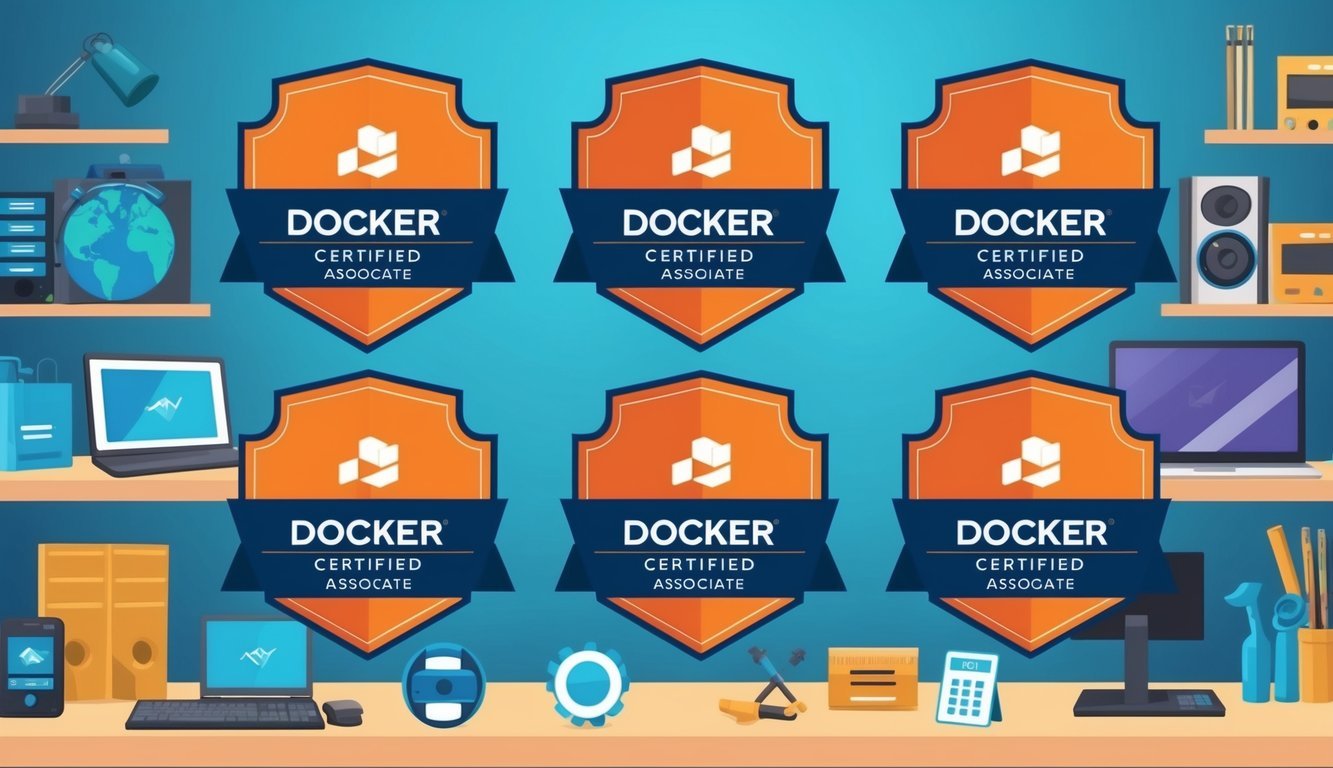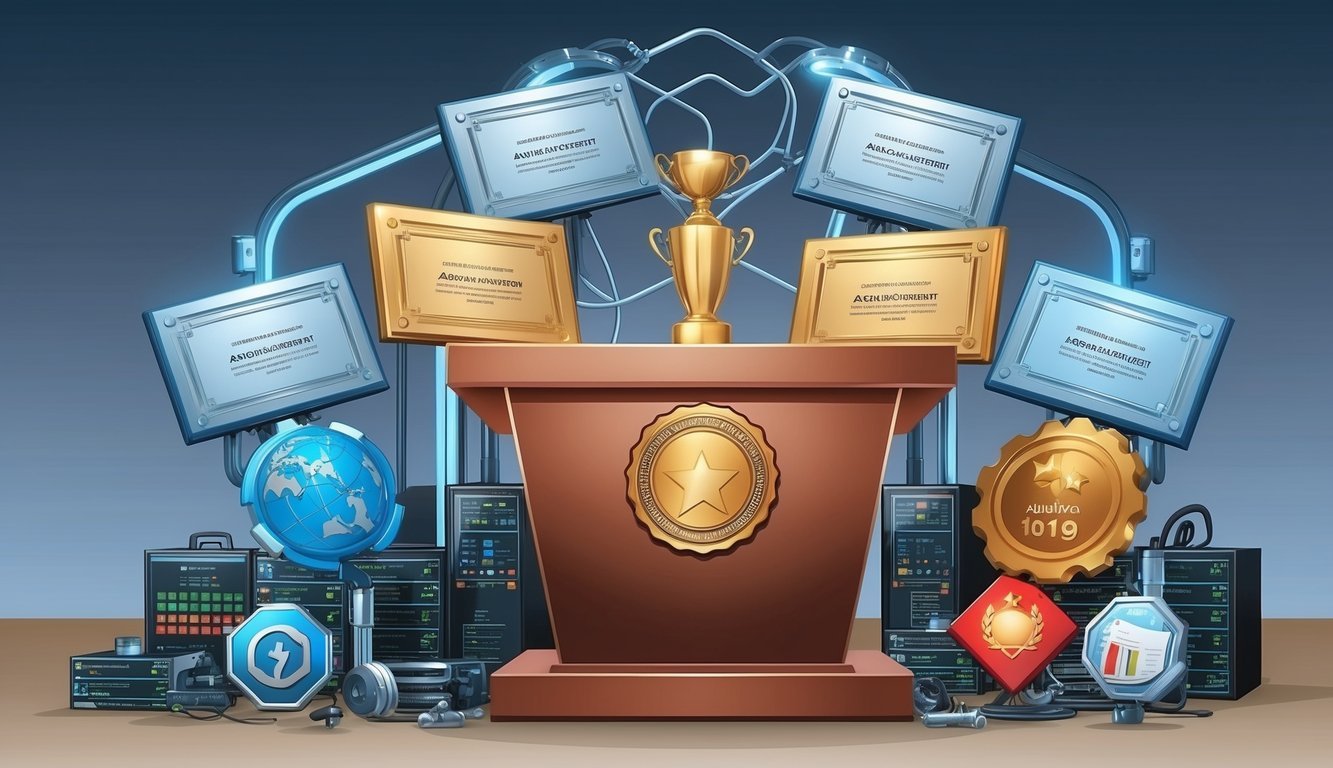DevOps is shaking things up in the software world, bringing development and operations teams together to work smarter and faster.
As more companies jump on the DevOps bandwagon, they’re on the hunt for talented professionals to guide the way.
It’s an exciting time to dive into this field!

Want to supercharge your career and paycheck? Get a DevOps certification! These programs equip you with essential skills and prove to potential employers that you’re the real deal.
Let’s look at the top 5 DevOps certifications you should consider if you’re ready to take your skills to the next level in 2024 and beyond.
1) AWS Certified DevOps Engineer – Professional
Ready to show off your DevOps chops? The AWS Certified DevOps Engineer – Professional certification is a fantastic choice.
It proves your expertise in handling AWS systems.
You’ll learn how to set up, manage, and run applications on AWS, but fair warning—this isn’t for newbies.
You’ll need a decent amount of experience to ace it.
The exam dives into topics like automation, continuous delivery, and system monitoring, ensuring applications run smoothly on AWS.
Scoring this certification could really open doors for your career and help you stand out in a crowded job market.
To prep, get familiar with AWS services and DevOps methodologies.
Plenty of study resources are out there to get you ready, but be prepared for some serious study sessions!
2) Google Professional Cloud DevOps Engineer
Want to elevate your DevOps game in the Google Cloud arena? The Google Professional Cloud DevOps Engineer certification might be just what you need.
This certification tests your capability to leverage Google Cloud for DevOps practices.
You’ll get hands-on experience setting up CI/CD pipelines, managing services, and tackling incidents like a champ.
The exam covers cool stuff like bootstrapping Google Cloud organizations and utilizing site reliability engineering.
If you’re already familiar with Google Cloud, this could be the perfect next step.
To get ready, check out the Coursera DevOps Engineer Professional Certificate.
This course offers practical experience with Google Cloud tools.
Not quite ready for the big exam? Start with the Associate Cloud Engineer cert; it’s a fantastic introduction before diving deeper.
3) Azure DevOps Engineer Expert
Thinking about becoming an Azure DevOps rockstar? The Microsoft Certified: DevOps Engineer Expert certification is your ticket.
This program is perfect if you’re eager to work with cross-functional teams.
You’ll learn to design and implement effective strategies for collaboration, code management, infrastructure, security, and all things CI/CD.
To earn this certification, pass the AZ-400 exam.
But hold on—first, you’ll need either the Azure Administrator Associate or Azure Developer Associate cert.
The AZ-400 exam covers a broad range of topics, including DevOps practices, source control, and Azure pipelines.
It’s a solid leap for your career and proves you can tackle complex DevOps solutions within Azure.
4) HashiCorp Certified: Terraform Associate

Want to boost your infrastructure automation game? Check out the HashiCorp Certified: Terraform Associate certification.
It showcases your skills in managing infrastructure as code with Terraform, a key tool in the DevOps toolkit.
This certification is a great fit for cloud engineers, developers, and ops folks dealing with infrastructure.
You’ll get the hang of using Terraform to create and manage resources across different cloud platforms.
The exam focuses on foundational Terraform concepts and how to apply them in practical situations.
To prepare, dive into HashiCorp’s official study materials, which include courses and practice exams.
The cherry on top? This cert is vendor-neutral, meaning you won’t be tied to just one cloud provider.
It’s a smart move if you want to enhance your DevOps credibility.
5) Docker Certified Associate

Want to prove you’ve got Docker skills? Checking out the Docker Certified Associate (DCA) exam could be your best bet, especially if you’re in the DevOps or software engineering space.
The DCA tests your knowledge of Docker fundamentals, image creation, and container orchestration.
You’ll need to be sharp on networking, security, and storage, too.
To prep for the exam, you’ve got loads of resources to choose from.
Online courses can give you the scoop, and practice tests can really help you nail down the info.
Plus, once you pass, your certification lasts for two years, showing employers you’ve got the Docker game down.
The best part? You can take the exam from the comfort of your home.
Just find a quiet space and make sure your internet connection is solid!
Understanding DevOps

At its core, DevOps blends software development and IT operations, speeding up product delivery.
It’s all about teamwork, automation, and constant improvement.
What Is DevOps?
DevOps represents a way of working that combines software developers with IT staff, aiming to make software creation and updates faster and more reliable.
Teams rely on automation tools to speed up their work and catch issues early on.
The ultimate goal? Deliver new features and fixes to users as quickly as possible while ensuring stability and performance.
It’s a game changer compared to the old-school method of rolling out big releases every few months.
Benefits of DevOps
DevOps can bring a lot to the table for companies, making software better and keeping teams happier.
Here’s what you can gain:
- Fix issues promptly
- Roll out new features regularly
- Reduce software bugs
- Keep your customers smiling
Plus, DevOps fosters collaboration between team members, bridging the gap between developers and IT professionals.
This teamwork leads to top-notch products and less stress for everyone involved.
In the end, it can save money by catching issues early and optimizing resource use.
Fancy that!
Thinking about leveling up your skills? The AWS DevOps certification can help you on that journey, proving your knowledge to employers.
Selecting the Right Certification

Choosing the right DevOps certification can be a game-changer for your career.
You’ll want to think about a few key factors and see what employers are looking for.
Researching in-demand qualifications can help guide your decision.
For example, if you’re considering best agile coaching certifications 2023, that could give you an edge as you seek continuous improvement.
Consider certifications that align with your career goals and with the tools or methodologies favored by your dream employers.
Don’t forget: getting certified in trending areas like cloud computing or continuous integration can keep you relevant in the job market.
With an increasing focus on corporate sustainability initiatives, learning those skills could be a fantastic way to stand out.
The right certifications can not only expand your knowledge but also position you as a proactive professional ready to take on the challenges of today’s software landscape.
Factors to Consider
When picking a DevOps certification, check out the topics covered.
Make sure they align with what you’re eager to learn.
Also, look for certifications that fit neatly within DevOps principles like automation and continuous delivery.
Think about how much time and money you can invest.
Some certifications require more study than others, and costs can vary quite a bit.
Take note of who’s offering the cert.
Big names like AWS and Microsoft have programs that hold weight, but don’t overlook respected organizations and universities.
They can offer certifications with real value, too.
When deciding, consider industry recognition, course depth, and hands-on opportunities.
Assess how the certification aligns with your career goals, so you’ll be ready for what future job markets might demand.
As the need for skilled professionals grows, taking courses in sought-after fields such as quantum computing and data analytics might just boost your employability.
Job Market Demand
Keep an eye on job requirements.
The AWS Certified DevOps Engineer is highly sought after, showing you can navigate cloud technology.
Azure DevOps certs are also gaining traction as more businesses migrate to Microsoft’s cloud solutions.
Some positions may require specific tool proficiency, and right now, Docker and Kubernetes skills are hot commodities.
Scan through job listings in your area to see which certifications appear most often; this can help you choose one that’ll make you shine in the eyes of employers.
Frequently Asked Questions

DevOps certifications can seriously up your game.
Let’s tackle some common questions about picking the right cert and how they can benefit your career.
What are the best DevOps certifications to consider as a beginner?
If you’re just starting out, the AWS Certified DevOps Engineer – Professional is a solid choice.
It covers essential DevOps concepts along with AWS tools.
Another great option is the Docker Certified Associate program, focusing on containers which are super relevant in the DevOps world.
How valuable is getting a certification in DevOps?
Landing a DevOps cert can be a game-changer.
It shows employers you know your stuff and can lead to better job opportunities and higher salaries.
Many companies actively look for certified professionals during hiring.
Which DevOps certifications are most recognized by industry experts?
The AWS Certified DevOps Engineer – Professional is very well-respected.
The Google Professional Cloud DevOps Engineer cert is also highly valued.
Both are known to be tough yet incredibly beneficial.
Can a DevOps certification really boost my career prospects?
Many DevOps professionals report that getting certified has helped them secure better jobs and earn more.
What’s the difference between AWS and Azure DevOps certifications?
AWS and Azure certs cater to different cloud platforms.
The AWS DevOps cert focuses on Amazon’s ecosystem, while the Azure DevOps Engineer Expert cert centers around Microsoft’s offerings.
Both teach valuable DevOps principles but with tools specific to each platform.
What’s the latest trend in DevOps certifications for 2024?
This year, it’s all about cloud-native DevOps.
The HashiCorp Certified: Terraform Associate certification is making waves, teaching the crucial skill of infrastructure as code.
Kubernetes certifications are also on the rise as more companies adopt container orchestration.

